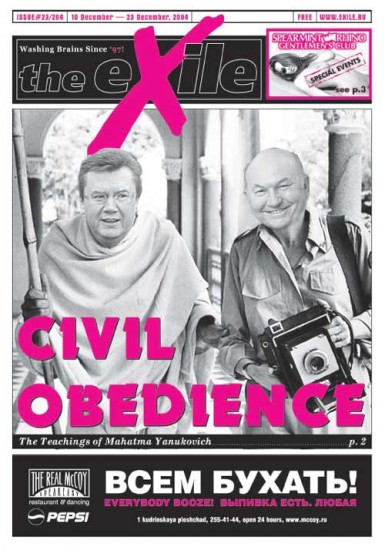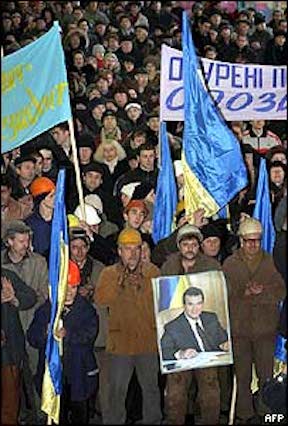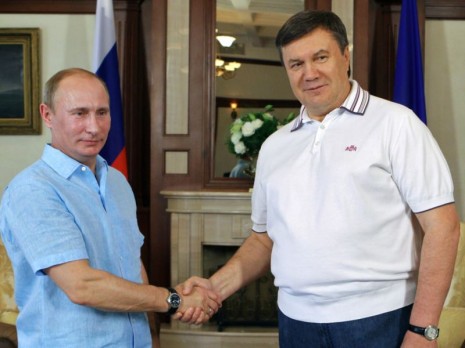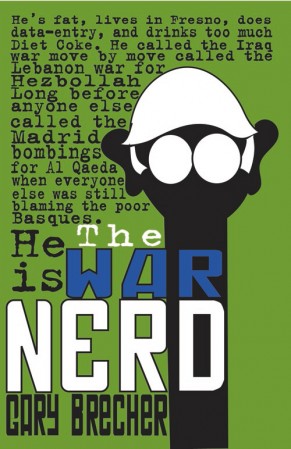This article was published in The eXile on December 10, 2004
DONETSK — Donetsk is a fascist city. I’m not using this term in the cheap way that it gets bandied around at a dinner table discussion between Republicans and Democrats. Donetsk actually is fascist. There is one party, people get beaten for opposition views, information is controlled, nationalist sentiment is enflamed with insane rhetoric about America/NATO plots to enslave Ukraine, and fear is the main motivating factor. It’s no coincidence that this is the side which Putin and the Russians are supporting. The “objective” Western press reports from there hide this fact by trying to “present both sides,” but I was just there, and there is no “other side.”
Just look at some examples of the fascist haze descending on Donetsk. Cable TV operators have actually stopped broadcasting opposition Channel 5. Media suppression of opposing views is so intense that it’s been driven literally underground — like the paper Ostrov that is being produced secretly. One local Yushchenko supporter told me about how her 9-year-old’s gym teacher asked the class who their parents voted for. “When the teacher found out that we were Yushchenko supporters, he made my son kneel in a corner for the entire class,” she told me.
When Salon, a Donetsk paper, reported two Sundays ago that a pro-Yushchenko rally was broken up before it even started, readers called to accuse them of printing lies — everyone here believes that it’s the Yushchenko protesters who have violent tendencies, even though there’s been a 30 percent drop in crime in Kiev since the protests started. What happened at that rally was that a well-organized group of men in track suits beat several people, including a Reuters photographer, and stole film and cameras — but officially, that simply didn’t happen. According to a spokesman from the Yushchenko headquarters, even an SBU operative (Ukraine’s FSB) recording the event for his own nefarious purposes was roughed up and had his video camera stolen.
This is part of a broader thug culture of Donetsk, part of a movement with Brown Shirts/Idushchii v Meste overtones. After a large rally last Monday, a group of 100 drunken thugs stood for hours shouting themselves hoarse and by 11pm, with no Yuschenko supporters to beat, several of them turned to fighting each other. While plenty of drunken people can be found among the protesters in Kiev (perhaps the most ecstatic participants in the revolution are the train station’s bomzhi, gorging themselves on free food and feeling safe now that the militsia has virtually disappeared), they aren’t aggressive or intimidating.
In Donetsk, they are frightening, unpredictable and above the law. Of course, that might just be Donetsk people acting normally. For example, there was a rumor that FT correspondent Tom Warner was beaten up by political thugs. As it turned out, he was simply robbed of his computer, phone and several hundred bucks by some common thieves. Another day, another crime.
* * *
Much has been made of eastern Ukraine’s support for Yanukovych, the pro-Russian prime minister who tried to steal the election. The Western and the Russian press both play up the issue, albeit for different reasons. Others, like my good friend Olya, who is an editor at a respected Ukrainian magazine, claimed everyone in Donetsk was just brainwashed.
What’s happening in Donetsk is the real key to figuring out what’s going to happen in Ukraine. The general situation in Ukraine has gotten plenty of coverage, but a brief outline of the facts is in order. Basically, Ukraine has always been divided into east and west, with the east Russian-speaking, heavily industrialized, and Russia-friendly; and the west Ukrainian-speaking, agrarian, and nationalist. Yanukovych is the east’s candidate, Yushchenko the west’s.
Almost all of Ukraine’s oligarchs are from the east or Kiev, and they almost exclusively lined up in support of Yanukovych, a Donetsk native. There are a few exceptions, notably Petro Poroshenko, the owner of car and candy factories and a ship-building yard. He also owns Channel 5, which was an invaluable tool in helping Yushchenko compete. In recent weeks, Channel 5 is the only Ukrainian channel to show news and propaganda 24 hours a day. A large part of the programming consists of watching Yanukovych’s team make asses of themselves. They often repeat a speech Yanukovych gave where he was gesturing with his fingers in the air, “paltsami,” a classic bandit gesture. Another favorite clip of theirs is of Yanukovych ally and Kharkov governor Kushnyarov gesticulating wildly and declaring, “I’m not for Lviv power, not for Donetsk power, I’m for Kharkov power!” Still, the biggest and most powerful clans are still behind Yanukovych, who is their man.
Yanukovych is a truly loathsome character. Most Ukrainians agree that if a more palatable candidate had been given the nearly unlimited access to “administrative resources” that Yanukovych had, he would have won handily. But Yanukovych twice served jail time in the Soviet Union, he has no charisma, and is obviously a tool of powerful Russian and Ukrainian interests. Yushchenko, on the other hand, is considered by most western Ukrainians to be something between Gandhi and Christ, while many people in the east worry he has it in for everyone who speaks Russian. Many people who voted for Yanukovych did so out of suspicion of Yushchenko, not because they like Yanukovych (except perhaps in his home turf, Donetsk).
While the country is relatively evenly divided, it’s a fact that Yushchenko would have won the election if it had been violation-free. Anyone who claims otherwise is either a fool or getting paid by the Russians. Even Putin, who called Yanukovych to congratulate him before all the votes were counted, recently said he’d be willing to work with any elected leader and seemed to acknowledge that there’d be a re-vote. Thanks to ballot-stuffing, Donetsk and the neighboring Lugansk oblast had by far the highest voter turnout in Ukraine (Donetsk had 97 percent turnout, of whom 97 percent voted for Yanukovych, and Yushchenko actually lost votes in between the first and second rounds of voting) and it’s on the basis of thousands of violations that the Supreme Court recently ordered a new round of voting. Channel 5 has plenty of footage of election observers getting the shit beaten out of them, and Yushchenko observers weren’t allowed anywhere near the polls in the Donetsk and Lugansk oblasts.
The blatant falsifications, combined with an extremely well-funded and coordinated protest movement, have brought us where we are today, gearing for another round. The protests have come under fire as an American-funded coup, particularly in the Russian media. And there’s some truth to it — the US has been bringing in Serbs and Georgians experienced in non-violent revolution to train Ukrainians for at least a year. One exit poll — the one finding most heavily in favor of Yushchenko — was funded by the US. The smoothness and professionalism of the protest, from the instant availability of giant blocks of Styrofoam to pitch the tents on to the network of food distribution and medical points, is probably a result of American logistical planning. It’s certainly hard to imagine Ukrainians having their act together that well. The whole orange theme and all those ready-made flags also smack of American marketing concepts, particularly Burson-Marstellar.
But the crowds in Kiev, which can swell up to a million on a good day and are always in the hundreds of thousands, are there out of their own homegrown sense of outrage, not because some State Department bureaucrats willed them there. The meetings that happen every day in virtually every city in Ukraine (and in literally every western Ukraine village) are not the result of American propaganda. Rather, they are the result of the democratic awakening of a trampled-on people who refuse to be screwed by corrupt politicians again.
While you wouldn’t know it by watching Russian TV, maybe the only two cities in Ukraine where there are not Yushchenko rallies that outnumber the Yanukovych rallies are Lugansk and Donetsk. According to my friends in the heavily Russian Kharkov, for example, active Yushchenko supporters outnumber active Yanukovych supporters four to one. One reason why Lugansk and Donetsk are an exception is because every time Yushchenko’s people try to organize a rally there, they get beaten. Another is because the vast majority of those two regions really do support Yanukovych. So what gives?
* * *
For hours after the pro-Yanukovych rally ended on Monday, November 29, a parade of some twenty cars raced up and down Ulitsa Artyoma noisily demonstrating which candidate they preferred. Judging by many of the cars in the procession — a couple of new Mercedes, a novel Smart Car, other inomarki, and a custom-painted Lada souped up for drag-racing — the drivers were members of the Donetsk elite. Judging by the whoops and screams of the passengers, many of whom hung outside the sunroofs and windows waving blue flags, the paraders were quite young and totally wasted.
Unfortunately I’d just arrived in Donetsk that evening and only caught the tail end of the rally, so I didn’t know what’d gotten them so riled up. I later saw an excerpt of it on Channel 5, where Yanukovych’s wife Ludmilla said that everyone involved in Kiev’s protests was in a drug-induced haze. “On Maidan [where Kiev’s protests are centered*, they’re distributing oranges injected with narcotics that people eat, and everybody wants more, and nobody can leave the square.” Perhaps more shocking, no one in Donetsk even blinked at what she said. (And on Kremlin-controlled Russian TV, they repeat the same lies about the protestors either being “psychologically unhealthy” or drug addicts.) Calling the hundreds of thousands of protesters that come out daily in Kiev the product of oranges pumped with drugs is not just absurd, it’s stupid. And yet in Donetsk, they were buying it.
But the hoods with nice cars cruised, horns blaring until well after 11, alternately driving slowly to build up a column of traffic behind them and then accelerating, speeding over the limit, disregarding such niceties as red lights and traffic laws. The GAI were absent because presumably the action was approved from up high, and the punks no doubt had powerful parents. One of the newest Mercedes — an S Series — was equipped with a loud speaker, used by some young thug to startle unsuspecting pedestrians: “Are you for Yanukovych?” Everyone said yes, myself included.
Of course, horns these days are a popular means of expression in Kiev as well. But it’s not the same group of cars, driving in circles and intimidating people. Instead, drivers honk to express solidarity with the “orange” protesters and drive on to their destination. It’s spontaneous, an outburst of a new sense of freedom and empowerment. There’s even the occasional blue-bedecked car that is allowed to pass unmolested, although God save anyone dumb enough to wear orange in Donetsk.
In Donetsk, there are blue ribbons and flags, “Ya-Nu-Ko-Vych” chants and honking horns, daily meetings and concerts, all mimicking the protests in Kiev. But it is the opposition tactics that Yanukovych’s hacks have not mimicked that are more striking: no tent city, no out-of-towners (except the press-corps), no information distribution, no sense of debate, no tolerance, no grassroots organization. The Donetsk demonstrations are just displays of top-down managed “democracy,” and the population there is passive enough to swallow it.
* * *
The Tuesday rally, which I witnessed in full, was like watching a farce of a Nazi rally. This time they introduced Ludmila Yanukovych but made sure not to give her the mike, lest she say something as ridiculous as her spiked-orange theory. However, the other speakers weren’t much more sane. One speaker after another spewed venomous anti-Kiev, anti-western Ukrainian, and anti-American rhetoric at the crowd of several thousand. One of the more famous, Natalya Vitrenko, is sort of a Zhirinovsky without the slapstick element. Vitrenko argued that the US planned to colonize and enslave eastern Ukraine and would use NATO as its muscle. Another speaker warned that east Ukraine would beat back the Americans like they had the Germans, and reminded the audience that western Ukraine welcomed the Nazis with bread and salt, keeping in the theme that Yushchenko’s the fascist here. Some of the other arguments were just silly; one doctor said that Yushchenko was destroying the nation’s health by forcing students to spend long hours in the cold, thereby causing a public health crisis (a line echoed on Russian state television). Another said under Yushchenko people would be jailed for speaking Russian and that the “orange plague” was a terrorist organization. Another popular theory was that western Ukraine was planning on raping the riches of the east and only regional autonomy could save them. Every speaker was fear-mongering and totally detached from reality.
Everyone in Donetsk repeats the same figures and statements obsessively. 15 million voted for Yanukovych, he is the legitimate president, and Yushchenko is an unchecked fascist. People in Kiev are brainwashed and undemocratic; Russian-speaking centers Odessa, Kharkov, Dneipropetrovsk and the Crimea will leap at the chance to form a breakaway republic with them; American money is behind everything. Funny they never mention a word about Russian funds used by Yanukovych, although estimates of Russian contributions reach up to $300 million.
One of the great things about “orange” Kiev is that everyone everywhere is engaging in political dialog, arguing about what’s happening, what it means, and predicting how things will turn out. In Donetsk, everybody uses the exact same descriptions and expressions, because they’ve all been brainwashed. And they’re defensive about their beliefs, even on their home turf.
People here freely admit that Yanukovych is a dishonest politician with unsavory connections, saying “Yes, he’s a crook, but he’s our crook.” One guy I asked how he felt about Yanukovych’s jail past replied, “So what? I’ve been in jail, too.” The guy who said that had a valid point — Donetsk has always been a bandit city since the time the Soviets populated the region’s rich mines with ex-cons. There’s nothing exceptional here about having done time.
It’s clear by the overwhelming number of expensive boutiques, restaurants and casinos that Donetsk has a larger bandit class than most places. It certainly isn’t miners spending their pay in these places. Ukraine’s wealthiest man, Rinat Akhmetov, is from Donetsk and took over his empire from his relative, Oleg Grek (Oleg the Greek), who was shot dead in the city’s stadium during the bloody gang wars of the mid-90s. Akhmetov’s behavior mirrors the city’s values; when he wanted a new house, he simply seized a well-loved playground in the center and built a fortified castle-like compound, a la Tony Montana. Actually, it’s not that dissimilar to how they planned on installing Yanukovych.
Everyone in Donetsk, repeating the propaganda, will also tell you that they’d never use political beliefs as an excuse to do nothing, like the lazy people of Kiev, and that people here continue to work through the crisis. It’s well-known that Yushchenko’s people pay 400 hr. (over $70) a day to hire Donetsk protesters, but officially, no-one would ever sell out. For the record, the average monthly salary in Donetsk is 784 hr. People absolutely refuse to believe that there was vote fraud. Actually, they simultaneously argue that there was none and that it was no worse than the fraud in western Ukraine, as if that unsubstantiated claim is justification for vote-rigging. One of their favorite points is that coal miners started receiving their pay and factories started working when Yanukovych was governor. In fact, wage arrears in the Donetsk oblast are by far the largest in Ukraine, making up 28.6 percent of the country’s total. In second place, with 13.2 percent of the total, is Lugansk oblast.
Revisionism is rife here. Donetsk governor Anatoly Bliznyuk’s denied that there had been talk of separatism at a congress in Severodonetsk two days earlier, yet the congress’s words and actions had already been reported. Politicians like Bliznyuk only started backpedaling when Yushchenko threatened separatists with arrest.
The people in Donetsk simply parrot what they are told. On Monday, November 29th, the day after the Severodonetsk conference, several people told me that there were two options: separation or war. On Tuesday, when Kuchma and Yanukovych seemed to come out in favor of a revote in Donetsk and Lugansk, people here were for the revote.
Meanwhile, back in Kiev, it’s hard to imagine a more positive vibe. Seeing the process of nation-building develop in front of my eyes was an amazing experience. Ukrainians have always had a more mellow character than the Russians, and it shows through in their revolution. The stuff you read about protesters eye-to-eye with storm troopers is lies — there’s actually four lines of massive pro-Yushchenko miner- and peasant-types standing on shipping crates to keep protesters from direct contact with the militsia. The feeling on the street is festive.
Babes are everywhere, and it’s the only place I’ve ever been where a pickup line is totally unnecessary. If she’s wearing orange, you’ve got a common language. While some people have wild delusions of EU membership in five years or the end of corruption that will never happen, on the ground in Kiev it does seem like democracy and free press is achievable.
Back in Donetsk, there is no trace of irony when they describe Kiev’s demonstrators as fascists, zombies, censors and separatists, words they ought to self-apply. But it’s exactly this passivity that makes the threat of separatism so hard to take seriously.
* * *
So what is really going on in eastern Ukraine? Is it dangerous?
All that’s really happening is that the authorities in Donetsk are cynically manipulating the people out of fear for their own positions. While the meetings attract old and young, all of who come at their own accord, they can hardly be called grassroots.
People in Kiev have made it clear that they’ll stay put until they win, and they certainly would be out in force even if there weren’t speeches and music. But would people here come out in Donetsk the authorities didn’t organize meetings? From what I saw, no way.
What’s happening in Donetsk is simply the panic and hysteria of a corrupt regime desperate to cling to power. They’ve proved that they are able to mobilize large groups of people to defend their interests, but those crowds have no life of their own. Create a situation which the local authorities find acceptable and the protests will melt away. Give the local authorities a guarantee of immunity from prosecution and continued control of their fiefdom and they’ll abandon the separatist rhetoric.
The people of Donetsk might not be happy with that development, but then, they’re used to being betrayed and cheated by their leaders. In time-honored tradition, they’ll grumble about corruption and do nothing about it. Unlike the rest of Ukraine, they haven’t experienced the euphoria of living free, and until they do, they’ll have no way to vent their outrage.
This article was published in The eXile on December 10, 2004
Read more:, Jake Rudnitsky, eXile Classic, Feature Story, Russia


Got something to say to us? Then send us a letter.
Want us to stick around? Donate to The eXiled.
Twitter twerps can follow us at twitter.com/exiledonline


















7 Comments
Add your own1. Castellano | December 4th, 2013 at 9:55 am
Fuck pro-NATO terrorist Ukrainian puppets!
2. adam | December 12th, 2013 at 10:01 am
Good piece, shame it’s not current.
3. Galtic Warrior | December 14th, 2013 at 5:17 am
Mark Ames, you’re a bitter Illuminati COMMIE
4. ngk | December 18th, 2013 at 10:21 pm
We miss you, Ames, and are always with you.
5. chugs | March 2nd, 2014 at 6:06 pm
come on exiled.
I don’t pay you nothing to re-read old material.
Where is War Nerd on a Ukraine vs Russia showdown and who’d win.
Where is Ames with his sharp witted exposure of the real behind the scene issues.
Why do we have to go to Pando to find anything new?
6. Daniel | March 22nd, 2014 at 10:38 pm
“People in Kiev have made it clear that they’ll stay put until they win”
I wonder if that still looks like victory now.
7. Ghost in the machine | June 10th, 2014 at 3:53 pm
Fast forward to present. This is like something Julia Ioffe would write in the New Republic. Not one of Exiled finer moments.
I have a suspicion the more sentient, less rah-rah neoliberal revolution–asides were added by Ames.
Leave a Comment
(Open to all. Comments can and will be censored at whim and without warning.)
Subscribe to the comments via RSS Feed